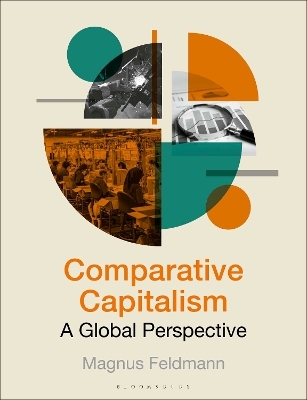
Comparative Capitalism
A Global Perspective
Seiten
2025
Bloomsbury Academic (Verlag)
978-1-350-42310-7 (ISBN)
Bloomsbury Academic (Verlag)
978-1-350-42310-7 (ISBN)
- Noch nicht erschienen (ca. Februar 2025)
- Versandkostenfrei
- Auch auf Rechnung
- Artikel merken
How do capitalist institutions vary across countries and regions? How is capitalist diversity related to political and social factors like inequality, representation, and political systems? How do capitalist institutions shape economic outcomes?
Comparative Capitalism takes a global approach to capitalist diversity. It considers not only liberal and coordinated market economies in the Global North, but also other varieties, such as networked, hierarchical, dependent and statist market economies in other parts of the world. It examines new models, such as growth regimes and growth models, and key trends such as the growing significance of finance and the rise of populism in the 21st century. Case studies are drawn from both the Global North and South, including East Central Europe, East Asia, Latin America, and the BRICS economies to highlight both domestic institutions and the role of economic integration on a global scale.
Including tables and overviews of key features of each model, Comparative Capitalism is essential reading for students of international and comparative political economy, international development, and business–government relations.
Comparative Capitalism takes a global approach to capitalist diversity. It considers not only liberal and coordinated market economies in the Global North, but also other varieties, such as networked, hierarchical, dependent and statist market economies in other parts of the world. It examines new models, such as growth regimes and growth models, and key trends such as the growing significance of finance and the rise of populism in the 21st century. Case studies are drawn from both the Global North and South, including East Central Europe, East Asia, Latin America, and the BRICS economies to highlight both domestic institutions and the role of economic integration on a global scale.
Including tables and overviews of key features of each model, Comparative Capitalism is essential reading for students of international and comparative political economy, international development, and business–government relations.
Magnus Feldmann is Associate Professor in Politics, School of Sociology, Politics and International Studies, University of Bristol, UK.
PART I: INTRODUCTION
1. Introduction: Why comparative capitalism in global perspective?
PART II: GLOBAL VARIETIES OF CAPITALISM
2. Liberal market economies
3. Coordinated market economies
4. Networked market economies
5. Hierarchical market economies
6. Dependent market economies
7. Statist market economies
PART III: NEW CHALLENGES AND NEW MODELS?
8. Growth regimes and the evolution of capitalism
9. Financialization
10. Growth models and the macroeconomy
11. The populist challenge: Comparative capitalism and the rise of populism
PART IV: CONCLUSION
12. Conclusion
| Erscheint lt. Verlag | 20.2.2025 |
|---|---|
| Verlagsort | London |
| Sprache | englisch |
| Maße | 189 x 246 mm |
| Themenwelt | Wirtschaft ► Volkswirtschaftslehre ► Wirtschaftspolitik |
| ISBN-10 | 1-350-42310-6 / 1350423106 |
| ISBN-13 | 978-1-350-42310-7 / 9781350423107 |
| Zustand | Neuware |
| Haben Sie eine Frage zum Produkt? |
Mehr entdecken
aus dem Bereich
aus dem Bereich
ausgehandelt? – wie offen ist die Weltgesellschaft?
Buch | Softcover (2024)
UTB (Verlag)
CHF 30,80
Theorie und Anwendung
Buch | Hardcover (2024)
Vahlen, Franz (Verlag)
CHF 55,70
wie sich unsere Wirtschaftspolitik ändern muss, damit wir globale …
Buch | Hardcover (2024)
Wiley-VCH (Verlag)
CHF 55,95


